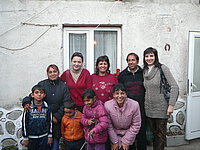Unraveling the molecular basis of hereditary spastic paraplegias –
Contribution from European Gypsies
PI: Prof. Albena Jordanova, PhD,
Molecular Neurogenomics Group, VIB Department of Molecular Genetics,
University of Antwerp, Belgium
Molecular Medicine Center, Department of Medical Chemistry and Biochemistry, Sofia Medical University, Sofia, Bulgaria
Co-PI: Prof. Ivaylo Tournev, MD, DSc
Department of Neurology, Sofia Medical University, Sofia, Bulgaria
Hereditary spastic paraplegias (HSP) are a group of rare neurodegenerative disorders of the upper motor neurons characterized by extreme clinical and genetic heterogeneity. The HSP disease is currently untreatable and poorly understood, warranting research on its etiology and potential targets for intervention.
We aim at clarifying the biological complexity underlying this condition focusing on the identification of novel genes and disease-causing mutations involved in HSP pathogenesis. Our special "research tool" will be the unique genetic heritage of Gypsies/Roma - the largest genetic and socio-cultural isolate of Europe. Research on HSP in this unique founder population provides a substantial and yet unexplored potential, as limited genetic diversity, large traditional families and shared ancestral mutations could simplify the etiological complexity of this disease.
We are collecting extended genealogical and clinical information of Gypsy familial and sporadic HSP cases. With this genetic material we will pursue four objectives: (i) Large scale SNP genotyping to search for disease associated loci using homozygosity mapping and linkage analysis. (ii) Patients linked to already known loci and genes will be further analyzed to identify the disease-causing mutations. (iii) Patients linked to unknown loci will be further compared to identify overlapping HSP-associated regions and shared haplotypes. Subsequently, (iv) whole exome/genome sequencing in selected individuals, (v) hit validation in patient cohorts from Gypsy and outbreed communities, and (vi) functional genomics approaches will allow identification of novel HSP genes.
The results of this study should contribute to identification of novel genetic entities and to a catalogue of genes and disease-causing genetic variants causing HSP that can subsequently be genotyped in large outbreed populations. In this way, our findings will be of general relevance for the research field and will be applicable to all national health care systems. The mutation identification will allow genotype-phenotype correlations and will have an important impact on the diagnostic of spastic paraplegias, genetic counseling and disease prevention.




